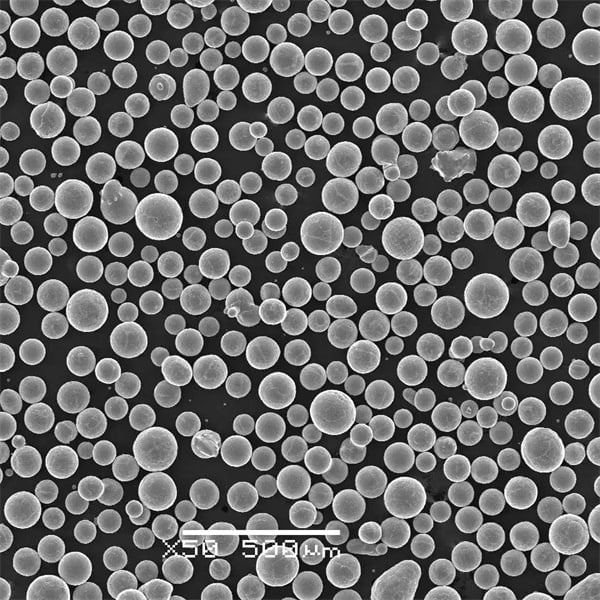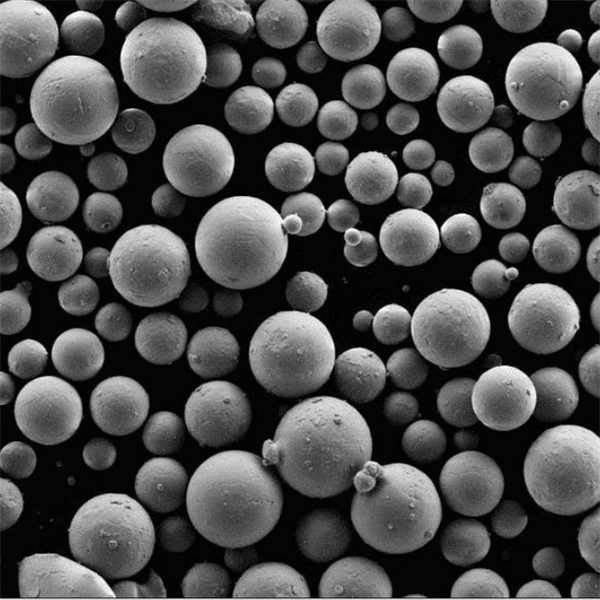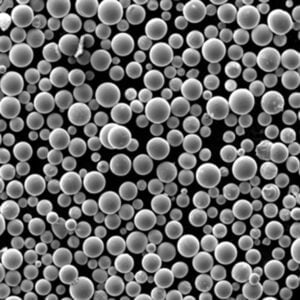Hållbar försörjning
Innehållsförteckning
Översikt
Begreppet en hållbar försörjning kedjan håller snabbt på att bli en hörnsten i modern tillverknings- och verkstadsindustri. Hållbar försörjning innebär integrering av miljövänliga metoder i inköp, produktion och distribution av material. Denna praxis syftar till att minimera miljöpåverkan samtidigt som den maximerar ekonomiska och sociala fördelar. Genom att anta hållbara leveransmetoder kan företag minska avfallet, sänka kostnaderna, förbättra effektiviteten och förbättra sitt varumärkes rykte. Men vad betyder detta i samband med metallpulver? Låt oss dyka in i världen av hållbar leverans av metallpulver och utforska dess konsekvenser, tillämpningar och bästa praxis i branschen.
Viktiga detaljer om hållbar försörjning av metallpulver
Hållbar försörjning i sfären av metallpulver kretsar kring användningen av förnybara resurser, återvinning och minskning av koldioxidavtrycket i samband med produktion och distribution. Detta tillvägagångssätt bevarar inte bara naturresurserna utan säkerställer också leveranskedjans livslängd och hållbarhet.
Tabell: Typer av metallpulver och deras hållbara egenskaper
| Metallpulver | Sammansättning | Fastigheter | Hållbara egenskaper |
|---|---|---|---|
| Aluminiumpulver | Al | Lätt, ledande | Återvinningsbar, låg smältpunkt |
| Titanpulver | Ti | Hög hållfasthet, korrosionsbeständig | Riklig i naturen, biokompatibel |
| Kopparpulver | Cu | Hög ledningsförmåga, formbar | Återvinningsbar, lågenergiraffinering |
| Pulver av rostfritt stål | Fe, Cr, Ni | Slitstark, korrosionsbeständig | Återvinningsbar, lång livslängd |
| Nickelpulver | Ni | Hög hållfasthet, korrosionsbeständig | Återvinningsbar, låg miljöpåverkan |
| Järnpulver | Fe | Magnetisk, hög hållfasthet | Rikligt, lätt återvinningsbart |
| Zinkpulver | Zn | Korrosionsbeständig, formbar | Återvinningsbar, låg smältpunkt |
| Magnesiumpulver | Mg | Lättvikt, hög hållfasthet | Riklig, biologiskt nedbrytbar |
| Brons pulver | Cu, Sn | Slitstark, korrosionsbeständig | Återvinningsbar, tillverkad av koppar och tenn |
| Koboltpulver | Co | Motståndskraft mot höga temperaturer | Återvinningsbar, låg toxicitet |

Tillämpningar av Hållbar försörjning i metallpulver
Tillämpningarna av metallpulver i hållbara leveranskedjor är enorma. De används inom additiv tillverkning, bilindustri, flyg, elektronik och medicinsk utrustning. Varje applikation drar nytta av de unika egenskaperna hos metallpulver, såsom lättvikt, styrka och återvinningsbarhet.
| Tillämpning | Metallpulver som används | Fördelar |
|---|---|---|
| Additiv tillverkning | Titan, aluminium, stål | Lätt, stark, anpassningsbar |
| Fordonsindustrin | Järn, aluminium, magnesium | Lätt, hållbar, korrosionsbeständig |
| Flyg- och rymdindustrin | Titan, aluminium, nickel | Högt förhållande mellan styrka och vikt, värmebeständighet |
| Elektronik | Koppar, Silver, Guld | Hög ledningsförmåga, formbarhet |
| Medicintekniska produkter | Titan, rostfritt stål | Biokompatibel, stark, korrosionsbeständig |
Specifikationer, storlekar, kvaliteter och standarder
Att förstå specifikationer, storlekar, kvaliteter och standarder för metallpulver är avgörande för deras effektiva tillämpning i olika industrier. Dessa parametrar säkerställer att metallpulvret uppfyller de erforderliga kvalitets- och prestandastandarderna.
| Metallpulver | Storlekar | Betyg | Standarder |
|---|---|---|---|
| Aluminiumpulver | 10-150 mikrometer | AA6061, AA7075 | ASTM B928, ISO 209 |
| Titanpulver | 15-45 mikrometer | Ti6Al4V, CP Grade 2 | ASTM B348, ISO 5832-2 |
| Kopparpulver | 20-100 mikrometer | C11000, C22000 | ASTM B152, ISO 431 |
| Pulver av rostfritt stål | 15-45 mikrometer | 316L, 304L | ASTM A240, ISO 5832-1 |
| Nickelpulver | 20-80 mikron | N02201, N06600 | ASTM B160, ISO 9723 |
| Järnpulver | 10-100 mikrometer | AISI 1008, AISI 1018 | ASTM A848, ISO 630-2 |
| Zinkpulver | 15-100 mikrometer | Zn22, Zn4Al | ASTM B418, ISO 752 |
| Magnesiumpulver | 20-100 mikrometer | AZ31B, AZ91D | ASTM B107, ISO 16220 |
| Brons pulver | 10-80 mikron | C93200, C95400 | ASTM B22, ISO 197 |
| Koboltpulver | 20-70 mikron | L605, Haynes 25 | ASTM F75, ISO 5832-4 |
Leverantörer och prisuppgifter
Att hitta pålitliga leverantörer och förstå prisdetaljerna är avgörande för att upprätthålla en hållbar leveranskedja. Olika leverantörer erbjuder metallpulver till olika prisklasser, beroende på kvalitet, kvantitet och specifikationer.
| Leverantör | Metallpulver | Prissättning (per kg) | Kommentarer |
|---|---|---|---|
| Metallpulver USA | Aluminium, titan, stål | $30 – $100 | Bulkrabatter tillgängliga |
| Global Metal Powders Ltd | Koppar, nickel, järn | $20 – $80 | ISO-certifierad |
| EcoPowders International | Magnesium, zink, brons | $25 – $90 | Hållbara inköpsmetoder |
| Advanced Powders Corp | Kobolt, rostfritt stål | $50 – $120 | Alternativ för hög renhet |
Fördelar och begränsningar med metallpulver i Hållbar försörjning
Att förstå för- och nackdelarna med att använda metallpulver i hållbara försörjningskedjor är avgörande för att fatta välgrundade beslut. Olika metallpulver erbjuder unika fördelar och begränsningar baserat på deras egenskaper och tillämpningar.
| Metallpulver | Fördelar | Begränsningar |
|---|---|---|
| Aluminiumpulver | Lätt, återvinningsbar, korrosionsbeständig | Dyr produktion, begränsad användning vid hög temperatur |
| Titanpulver | Hög hållfasthet, biokompatibel, korrosionsbeständig | Hög kostnad, komplex bearbetning |
| Kopparpulver | Hög ledningsförmåga, återvinningsbar, antimikrobiell | Tung, benägen för oxidation |
| Pulver av rostfritt stål | Slitstark, korrosionsbeständig, återvinningsbar | Dyrt, kräver högenergiproduktion |
| Nickelpulver | Höghållfast, korrosionsbeständig, återvinningsbar | Toxicitetsproblem, höga kostnader |
| Järnpulver | Riklig, lätt återvinningsbar, magnetisk | Rostbenägen, begränsad användning vid hög temperatur |
| Zinkpulver | Korrosionsbeständig, återvinningsbar, låg smältpunkt | Sköra, begränsade strukturella tillämpningar |
| Magnesiumpulver | Lätt, riklig, biologiskt nedbrytbar | Brandfarligt, reaktivt med vatten |
| Brons pulver | Slitstark, korrosionsbeständig, återvinningsbar | Tunga, begränsade strukturella applikationer |
| Koboltpulver | Hög temperaturbeständighet, återvinningsbar, låg toxicitet | Dyrt, begränsad tillgänglighet |
Hållbar försörjning Kedjeövningar
Att implementera hållbara metoder för försörjningskedjan involverar flera strategier, inklusive att anskaffa råvaror på ett ansvarsfullt sätt, optimera produktionsprocesser och säkerställa effektiva distributionsmetoder.
Ansvarsfullt inköp av råvaror
Ansvarsfulla inköp innebär att välja leverantörer som följer miljö- och etiska standarder. Detta säkerställer att de material som används i produktionen erhålls utan att skada miljön eller kränka mänskliga rättigheter.
Optimera produktionsprocesser
Att optimera produktionsprocesser för att minska avfall och energiförbrukning är avgörande för hållbarheten. Detta kan uppnås genom användning av avancerad tillverkningsteknik, såsom additiv tillverkning, vilket minimerar materialspill.
Säkerställa effektiva distributionsmetoder
Effektiva distributionsmetoder minskar koldioxidavtrycket i samband med transporter. Detta kan uppnås genom att optimera logistiken, använda förnybara energikällor och genomföra program för koldioxidkompensation.
Miljömässiga och ekonomiska fördelar med hållbar försörjning
Hållbara leveranskedjor erbjuder betydande miljömässiga och ekonomiska fördelar. Dessa inkluderar att minska utsläppen av växthusgaser, bevara naturresurser och sänka produktionskostnaderna.
Fördelar för miljön
- Minskat koldioxidavtryck: Hållbara leveranskedjor minimerar utsläppen av växthusgaser genom att använda miljövänliga material och energieffektiva processer.
- Bevarande av naturresurser: Genom att återvinna och återanvända material hjälper hållbara leveranskedjor till att bevara naturresurserna.
- Minskat avfall: Avancerade tillverkningstekniker, såsom 3D-utskrift, minskar materialspill och förbättrar resurseffektiviteten.
Ekonomiska fördelar
- Kostnadsbesparingar: Effektiva produktionsprocesser och minskat materialspill leder till betydande kostnadsbesparingar.
- Ökad konkurrenskraft: Företag som använder hållbara metoder får ofta en konkurrensfördel på marknaden.
- Förbättrat varumärkesrykte: Hållbara metoder förbättrar ett företags varumärkesrykte och lockar till sig miljömedvetna konsumenter.
Utmaningar vid implementering av hållbara leveranskedjor
Trots de många fördelarna innebär implementeringen av hållbara leveranskedjor också flera utmaningar. Dessa inkluderar höga initiala kostnader, komplex logistik och behovet av tekniska framsteg.
Höga initiala kostnader
Övergången till hållbara försörjningskedjor kräver ofta betydande förhandsinvesteringar i ny teknik och processer. Detta kan vara ett hinder för små och medelstora företag.
Komplex logistik
Att hantera en hållbar försörjningskedja innebär komplex logistik, inklusive samordning med flera leverantörer och säkerställande av efterlevnad av
miljöstandarder.
Behov av tekniska framsteg
Ett framgångsrikt genomförande av hållbara leveranskedjor är mycket beroende av tekniska framsteg. Detta inkluderar utveckling av nya material, tillverkningsprocesser och distributionsmetoder.
Framtida trender inom Hållbar försörjning Kedjor
Framtiden för hållbara leveranskedjor ser lovande ut, med flera trender som kommer att revolutionera branschen.
Ökad användning av förnybar energi
Antagandet av förnybara energikällor, såsom sol- och vindkraft, förväntas öka, vilket minskar koldioxidavtrycket från försörjningskedjorna.
Framsteg inom additiv tillverkning
Framsteg inom additiv tillverkningsteknik, såsom 3D-utskrift, kommer att fortsätta att förbättra resurseffektiviteten och minska avfallet.
Utveckling av smarta leveranskedjor
Integrationen av smarta tekniker, såsom IoT och AI, kommer att möjliggöra en mer effektiv och transparent hantering av försörjningskedjan.

Slutsats
Hållbara leveranskedjor är inte bara en trend utan en nödvändighet för framtidens tillverkning och ingenjörskonst. Genom att anta hållbara metoder kan företag inte bara minska sin miljöpåverkan utan också uppnå betydande ekonomiska fördelar. Användningen av metallpulver i hållbara leveranskedjor erbjuder många fördelar, från att minska avfallet till att förbättra effektiviteten. Men det innebär också utmaningar som måste hanteras genom tekniska framsteg och strategisk planering. När vi går framåt kommer antagandet av hållbara leveranskedjor att bli allt viktigare, driva på innovation och forma industrins framtid.
VANLIGA FRÅGOR
| Fråga | Svar |
|---|---|
| Vad är hållbar försörjning? | Hållbar försörjning innebär att miljövänliga metoder integreras i inköp, produktion och distribution av material. |
| Varför är hållbar försörjning viktigt? | Det minimerar miljöpåverkan, sparar resurser, minskar avfall, sänker kostnader och förbättrar varumärkets rykte. |
| Vilka är fördelarna med att använda metallpulver? | Metallpulver erbjuder hög återvinningsbarhet, lätta egenskaper och styrka, vilket gör dem idealiska för olika applikationer. |
| Vilka är utmaningarna med hållbar försörjning? | Höga initiala kostnader, komplex logistik och behovet av tekniska framsteg är betydande utmaningar. |
| Hur kan företag implementera hållbar försörjning? | Genom att anskaffa råvaror på ett ansvarsfullt sätt, optimera produktionsprocesser och säkerställa effektiva distributionsmetoder. |
| Vilka är de framtida trenderna inom hållbar försörjning? | Ökad användning av förnybar energi, framsteg inom additiv tillverkning och utveckling av smarta leveranskedjor är viktiga framtida trender. |
Dela på
MET3DP Technology Co, LTD är en ledande leverantör av lösningar för additiv tillverkning med huvudkontor i Qingdao, Kina. Vårt företag är specialiserat på 3D-utskriftsutrustning och högpresterande metallpulver för industriella tillämpningar.
Förfrågan för att få bästa pris och anpassad lösning för ditt företag!
Relaterade artiklar

Högpresterande segment för munstycksvingar: Revolutionerande turbineffektivitet med 3D-utskrift i metall
Läs mer "Om Met3DP
Senaste uppdateringen
Vår produkt
KONTAKTA OSS
Har du några frågor? Skicka oss meddelande nu! Vi kommer att betjäna din begäran med ett helt team efter att ha fått ditt meddelande.

Metallpulver för 3D-printing och additiv tillverkning
FÖRETAG
PRODUKT
cONTACT INFO
- Qingdao City, Shandong, Kina
- [email protected]
- [email protected]
- +86 19116340731
















